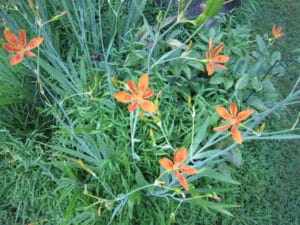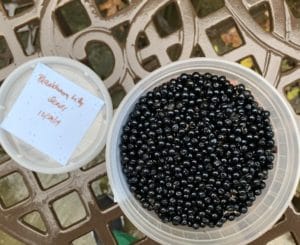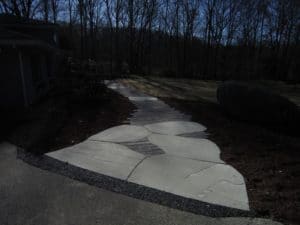Hello Fellow Readers,
A dear client shared a quart of lily seeds with me and colleague Robert who installed a magnificently unique walkway – massive flagstones mixed with pavers that look like wood.
Blackberry Lilies were competing heartedly with invasive Stilt Grass
“They’re Blackberry Lilies,” Suzanne of Stillwater NJ said, a plant new to me. When I first visited Suzanne, they were in their glory despite being squelched by an infestation of Stilt Grass (Microstegium vimineum), the mini bamboo-like invader that came from shipping containers that seem to be taking over our world. Of all her perennials, only the Blackberry Lilies were competing heartedly with the Stilt Grass, and so, I guessed they too might be considered invasive. Maybe not! One of the joys of working with fellow gardeners is learning about unusual plants.
Blackberry Lilies are not lilies at all
I learned Leopard Lily is another common name, though it’s technically not a lily at all. Its botanical name was changed to Iris domestica not long ago. The sword-like leaves grow out of tuberous rhizomes (underground stems), which gives its iris family origin away, though the flowers don’t.
Suzanne’s Blackberry Lilies are bright orange. They can also be yellow – both with daisy-like petals with charming reddish freckles that rise three feet above the eighteen-inch foliage. From a distance, the plant nor the flower are particularly showy. So its best to include them in a mixed perennial border along a walkway where you can admire them close up.

 The flowers only last a day or so, but their prolific nature creates a summer bloom cycle lasting several weeks. When the blooms fade, the most beautiful seedpods emerge. Many of them! They look like blackberries, but longer, which merits their common name. In the winter, the seedpods are especially eye-catching against a canvas of snow. Although, by leaving the seeds standing, their ambitious self-seeding may justify the invasive reputation amongst some.
The flowers only last a day or so, but their prolific nature creates a summer bloom cycle lasting several weeks. When the blooms fade, the most beautiful seedpods emerge. Many of them! They look like blackberries, but longer, which merits their common name. In the winter, the seedpods are especially eye-catching against a canvas of snow. Although, by leaving the seeds standing, their ambitious self-seeding may justify the invasive reputation amongst some.
Blackberry Lilies are easy to grow. Hardy in Zones 5 to 10, they like well-drained moist soil and full to part sun. Sow the seeds a quarter-inch deep in early spring after the danger of frost. Or, start them indoors for earlier bloom. Either way, they’ll bloom their first year.
They spread by their underground rhizomes as well as self-seed, which is why these short-lived perennials can keep on growing even amongst a field of invasive Mary Grass, another common name of Stilt Grass, though I take no ownership.
Soil remediation to overcome Stilt Grass infestation
Because the seeds of Stilt Grass are viable for seven years, Suzanne agreed to soil remediation, which involves removing the top six to eight inches of soil and replacing it with new composted soil. In the process of the garden renovation, we were careful when transplanting her adored plants. The Lilacs and Hydrangea were gifts from her family over the years. We brushed away the contaminated soil and transplanted them as bare rootstock.
By providing new soil for the established roots gifted from the love of family, they will continue to grow and thrive. Garden Dilemmas? AskMaryStone@gmail.com (and now on your favorite Podcast App.)
Click through to learn more about Stilt Grass
Tune in to Episode 8: Late Fall To-Dos, Holiday Decorating with ‘Roadkill’ on our Podcast Page (or favorite Podcast app for the Garden Dilemmas Podcast )

Creatively installed by Robert of Sierra Landscape Management.





So, where can one get these “Blackberry Lily” seeds?
Hello Mary, Having never known of these beauties previously, I have not come across seeds locally (until my dear client shared some). You can find them online on Swallowtail Garden Seeds, Select Seeds, and The Vermont Wildflower Farm sites. I’ve not sourced from them previously, but they seem reliable. Let me know how you make out. Thanks for reading my column :^), Mary